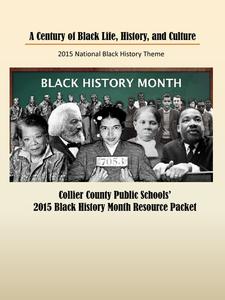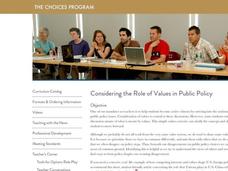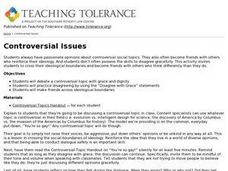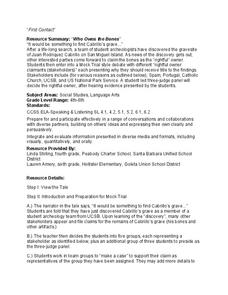Florida Association of Social Studies Supervisors
A Century of Black Life, History, and Culture
Packed with a wealth of information about African-Americans of note, this packet, and the links it provides to other resources, could be used as is for a month-long study of Black history or to supplement lessons already in your curriculum.
Brown University
Considering the Role of Values in Public Policy
Strong opinions come from deeply held values. Young citizens explore the values that are most important to them in a class discussion and activity. As they prioritize a list of values cards that include freedom, justice, and democracy,...
Missouri Department of Elementary
The Successful Student: Let’s Review for Better Achievement
Study skills, time management skills, and test taking-skills are important attributes for both the classroom and the real world. Focus on these learning skills in a lesson that reviews how to be a good student and make better grades.
C-SPAN
14th Amendment Equal Protection Clause
Two Supreme Court cases, Plessy v. Ferguson and Brown v. Board of Education take center stage in a lesson about the Equal Protection Clause of the 14th Amendment. Class members research both cases to compare and contrast the rulings.
Curated OER
Controversial Issues
Hot topics are often engaging and can get heated. High School students engage in an academic discussion were they must learn to engage with a person holding a different view than their own. They practice discussing different opinions...
Curated OER
Educating Myself Benefits Others
Most upper graders don't realize that when they choose to attend college, they're benefiting the whole community. Invite them to explore how they, as educated individuals, can contribute to their family, community, and global society....
iCivics
Why Government?
Why do people create governments? Where did we get our ideas about government? This is a fantastic introductory lesson for your American government class that begins by reviewing the philosophies of Thomas Hobbes and John Locke in...
School Improvement in Maryland
Analysis of Marbury v. Madison
Should the United States Supreme Court have the power of judicial review? Instructors guide class members through a review of Marbury v. Madison and assist class members in writing a brief of the case. As independent practice,...
US Institute of Peace
Responding to Conflict: Nonverbal Communication
What does your posture say about you? How can it affect the outcome of conflict resolution or negotiation? Show scholars the importance of nonverbal communication during the sixth in a series of 15 peacebuilding lessons. Learners work...
Curated OER
Transparent Shoebox Dig
Take this simulated archaeological dig one layer at a time with your young pupils to encourage observation, critical thinking, and careful attention. Using a transparent box full of layers of sand and artifacts, pupils examine the...
Museum of Tolerance
And Justice for All? Slavery Not Just in the Past
Slavery in India, Sudan, and Mauritania? What about in the United States? Groups research modern slavery in these four countries, collecting factual evidence (What), determine their feelings about this evidence (So what), and consider...
Channel Islands Film
Who Owns the Bones
A study of the history of the Channel Islands, located off the coast of southern California, continues as class members conduct a mock trial to determine which group of stakeholders should have the right to claim the remains of Juan...
US House of Representatives
Objects in Time
Artifacts can be used to study people and events of the past. That's the takeaway from the fifth lesson plan in a unit study of African Americans who served in Congress. Groups select an artifact associated with a Black Congress Member...
University of the Desert
A Plan For Positive Action
Can one person really make a difference? As the culminating instructional activity in a twelve-part series, learners discuss how they can partake in an intercultural dialogue that can have a lasting impact on the global community, and...
Alabama Department of Archives and History
The Effect of the Great Depression on Children and Education
What was it like to be a kid growing up during the Great Depression? Academics study primary sources to analyze the effect of school closures on children during the Great Depression. They then participate in group discussions and writing...
EngageNY
Grade 9 ELA Module 3, Unit 1, Lesson 5
Ninth graders study the study of animals in an informational text lesson plan that focuses on analyzing text structure. As learners continue reading the first chapter of Temple Grandin's Animals in Translation, they form inquiries and...
US House of Representatives
Women Pioneers on Capital Hill, 1917–1934
As part of a study of the women elected to Congress from 1917 to 1934, groups research and then design a museum exhibit that describes the life and the congressional service of one of these women.
Jamestown-Yorktown Foundation
Life of a Private Lesson Plan
In order to understand the challenges the Continental Army faced during the American Revolution, class members analyze primary source materials including a soldier's journal and an officer's letter, and watch a short reenactment video.
National Endowment for the Humanities
Planning for Treaty Negotiations
The party is over. Now it's time to get to work! Learners acting as agents for a country during the modern Age of Empires develop proposals to negotiate trade deals between the rising global powers. Using research from previous lessons,...
Curated OER
Contents and Containers
There is no better way to understand a different culture than to participate in its traditional or ceremonies. This lesson kicks off with a discussion about a tea container made during the Edo period in Japan. After examining the vessel...
Albert Shanker Institute
The March on Washington Logistics Then and Now
I have a dream ... that all pupils will be able to organize a march of their own after learning about how Bayard Rustin organized the 1963 March on Washington for civil rights. Young reformers work collaboratively examining informational...
Southern Poverty Law Center
Analyzing Gender Stereotypes in Media
Why might toy advertisers use gender stereotypes to sell their products? Young people think critically about media messages and its role in gender stereotyping with a thought-provoking instructional activity.
K20 LEARN
Plessy v. Ferguson: An Individual's Response to Oppression
After generating research questions rated to segregation, groups are given a primary source document (Jim Crow Laws, Black Codes, Plessy v. Ferguson, etc.) and craft a presentation that details the key elements of their assigned...
Judicial Branch of California
Fayette v. Take Two: The First Amendment
An informative lesson provides scholars the opportunity to study a Supreme Court case regarding the First Amendment and make a ruling with the members of their group. Class members also participate in group discussion and prepare a...
Other popular searches
- Esl Social Studies Lessons
- Social Studies Lessons Rome
- Social Studies Lessons Japan
- Social Studies Lessons on Maps

























